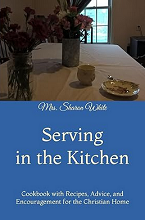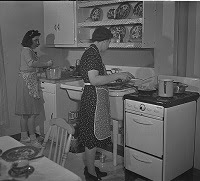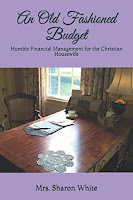 |
| Library of Congress: Husband and Wife going over House Account in 1941 Minnesota |
As another month draws to an end, it is time to reflect on the household budget. I am ready to close out this month's account. This is where I add up all the bills that were paid, the money I spent, and the money I gave away. Every dollar and dime are accounted for because I write it in a book. This helps me see what I am doing wrong, or how I can fix things for the coming months. It also keeps a record (or a history) of our home expenses.
A good housekeeper must be a good manager. One of the biggest goals she should have is to live on a budget. She must learn to live within the income the house is provided with. This takes time and effort. It even takes a great deal of wisdom and logic to avoid the traps and temptations of the advertising world around us.
We are taught, in our modern world, to save money by spending it. This is a genius advertising method to get us to spend as much money as possible. There are many ways to save money and we must learn to be creative and find what works in our own situation. For instance, I can tell you how to save money on winter heat here in Vermont. But it will not help someone living in Florida. We can share ideas on how to save, but we must take only the advice which works for our own family.
We had a couple of high bills outside of our budget recently. A car repair bill (which I consider to be part of a yearly expense) was more than I expected. There were also a few emergency trips which cost extra money in gas and charity. This put me over my spending. Since we live on a fixed income, I had to take the extra money out of a small savings account to make up the difference. This is not good because that savings cannot be replaced. So next month I have readjusted my expenses to keep my spending low. One of the biggest ways I did this was to cut my gas and grocery money. This means I will have to work much harder in making homemade meals and to stay home as much as possible. These are not difficult things to do, but they do take time and effort. They also require some sacrifice on my part. I am willing to do this because it will help our family and home for the long term.
I could either be wasteful and foolish or I can be frugal and careful. I choose to work here at home, doing my part, to keep us out of the poor house. Every housekeeper ought to have that same attitude. The lady of the house can spend her family into poverty or she can manage the money well and bring peace and security into her home for many years. The stability of a home depends on how well the household funds are managed.
Does it matter if you are poor or rich? In other words, is it okay to be careless and carefree and wasteful in our management of money just because we have plenty? Being frugal and a good manager of one's income is something every single household should practice. No business will last long if they spend more than they make. No household will stay out of the poor house if they spend more than they make. One should not make a habit of spending out of the savings account or of getting into debt to get through the month. All of us have to live within our income.
I want to explain the importance of little savings. We can earn a few pennies in a savings account. We may look at our bank statement and think it is a paltry, insignificant income. However, if you think about that interest earned in a new way - you may be more likely to appreciate every little dime.
1. I have been paying my electric bill over the phone with a check (or debit card) for over a year. There is no fee. There is no cost. This has saved me one stamp per month. That is like earning 48 cents in interest for the month.
2. I just learned that I can also do this with my phone bill. This will save me another stamp and earn me another 48 cents.
In these two items I have earned almost a dollar by doing something different. That is 12 dollars a year which could buy a gift for someone's birthday. It is by being creative and by being careful with money that we can be successful managers. Can we face most all things in our financial life in a similar way? Could we try to spend less in every aspect of our household without really changing our quality of life?
The housekeeper's budget is just a simple notebook listing all the fixed expenses like the rent or mortgage. It includes the electric bill, the phone bill, and the cost of insurance. There is an amount for groceries and gas and any other expense that is required to run one's home.
Another book could be the "house account" book where all the money that is spent is recorded as they happen throughout the month. This is where we see the truth of how the budget is working. We can see any mistakes we make or any changes that are necessary. It takes a bit of thought and time to keep household financial books, but they are an important part of managing a home with care and wisdom.
Blessings
Mrs. White
For details on keeping track of spending - House Account - A Prudent Homemaker.
From the Archives -
A 12 Week Challenge for saving and giving - My Book - Economy for the Christian Home.
Simple Living - Retirement Planning for the Poor.
The precious joy of Grandchildren - I hear Angels Crying.
- To find out more about this blog, or Mrs. White, please visit our About page. -


































